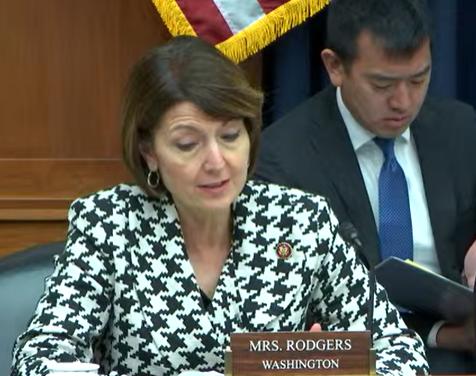
WASHINGTON, D.C. — The Ranking Member of the House Energy & Commerce Committee welcomed “for the first time in too long” five FCC Commissioners to Capitol Hill to participate in an Oversight Hearing. That said, Rep. Frank Pallone (D-N.J.) noted in his opening remarks that the hearing wasn’t about to address a wide range of topics, which is typical of such an affair.
Indeed, Communications and Technology Subcommittee Chair Bob Latta (R-Ohio) and House E&C Chair Cathy McMorris Rodgers (R-Wash.) devoted the session to Broadband. How did Pallone react? It “is fine with me.”
Why is that? “Because after all, President Biden and Congressional Democrats delivered for the American people with the Bipartisan Infrastructure Law. That’s driving broadband access, adoption, and affordability across America.”
Don’t tell that to Latta, Rodgers, or FCC Commissioners Brendan Carr or Nate Simington. They’re vehemently opposed to the Notice of Proposed Rulemaking introduced by Chairwoman Jessica Rosenworcel, and passed by a 3-2 party-line vote, to consider the return of Title II classification to Broadband.
In fact, Latta and Rodgers are so incensed by the plan that they’ve chastised “President Biden’s FCC” for pushing the partisan rulemaking too far. This explains why the hearing bears the name “Oversight of President Biden’s Broadband Takeover.”
Speaking of the Bipartisan Infrastructure Law, Pallone noted how it invests $42 billion in bringing broadband “to every corner of this country” and is lowering internet bills through a bipartisan Affordable Connectivity Program. Also, Pallone said, the program is preventing digital discrimination. Alas, Pallone remarked, “While this historic law garnered some Republican support, not one Republican on this Committee today voted for it. If broadband affordability and accessibility are so important to my Republican colleagues, I would have thought they would have joined us in supporting this historic investment in all of our Congressional districts.”
Then, there is “net neutrality,” a highly contentious subject that indirectly impacts broadcast media, in particular as they grow their podcast and streaming business. For Pallone and Democrats, the NPRM introduced by Rosenworcel “will correct an unpopular and misguided Trump administration policy change that amounted to a dereliction of the FCC’s nearly 100-year-old duty to oversee our communications networks.”
While Republicans insist that the removal of Title II broadband classification did absolutely nothing harmful to the internet, Pallone believes the Pai Commission action has led to frustrations with the FCC’s traditional oversight functions. This includes limiting the Commission’s ability to investigate network outages, protect consumers, and promote national security. “Indeed, since the previous administration gave up authority over broadband, nearly 250,000 consumer complaints against broadband providers have piled up at the FCC,” Pallone said. “That’s 250,000 complaints that have not been investigated or addressed. Restoring net neutrality protections would once again allow the FCC to resolve these complaints, and that would be a major win for consumers.”
In sharp contrast, Latta slammed the one-sided approach to broadband classification that has transpired since Anna Gómez was confirmed as the fifth Commissioner, giving Democrats and the Biden Administration their long-awaited majority.
“The Commission finally has a full slate of Commissioners and moved aggressively to advance partisan initiatives despite calls from this Committee to continue down a bipartisan path,” Latta bemoaned. “Since September, Chair Rosenworcel has pursued a federal government takeover of the internet.”
To reclassify broadband as a common carrier under Title II of the Communications Act is an effort Latta believes “is unnecessary and simply defies logic.” Since the removal of Title II broadband classification under the FCC’s leadership of Ajit Pai, “our networks have performed remarkably well,” Latta said. “They withstood the increased usage caused by the COVID-19 pandemic and, unlike Europe, our regulators did not have to ask sites to throttle or degrade their service. Providers were able to respond quickly to the demand. Turning away from this success and adding additional regulations will make deployment more difficult. This simply makes no sense.”
Meanwhile, Latta criticized the FCC’s final approval of digital discrimination rules by commenting, “Congress directed the FCC to adopt rules to ‘facilitate equal access to broadband internet service.’ However, the rules adopted by the FCC go far beyond Congress’ intent. Among other provisions, the rules adopt a ‘disparate impact’ standard for determining violations rather than focusing on intentional discrimination. The FCC’s new rules permit the FCC to micromanage the broadband industry and dictate to providers where to build, how much to charge, and what kind of services to offer. Burdensome and expansive regulations like these will only discourage broadband buildout at a time when Americans need it most.”
For Rodgers, she said, “The last time we had this debate during the Trump administration, Democrats claimed that the Internet as we knew it would end, that we would get the Internet one-word-at-a-time, and that repealing net neutrality would hasten the death of the Internet. Since the repeal of the Democrats’ last broadband takeover effort in 2017, investment in broadband networks is up, speeds are up, and prices are down.”
Speaking out against the FCC’s digital discrimination regulations, Rodgers added, “These new regulations will put burdensome requirements on our nation’s broadband providers, leading to government bureaucrats micromanaging Americans’ Internet access.”
Pallone concluded his prepared remarks by noting the need to restore the FCC’s spectrum auction authority. “I know that Chairwoman Rodgers has been as concerned about that as I am,” he said. While that may be true, stopping “net neutrality” was clearly the No. 1 concern, and will likely remain so for the next several weeks.
Spectrum auction authority was not mentioned by Latta in his prepared statement.